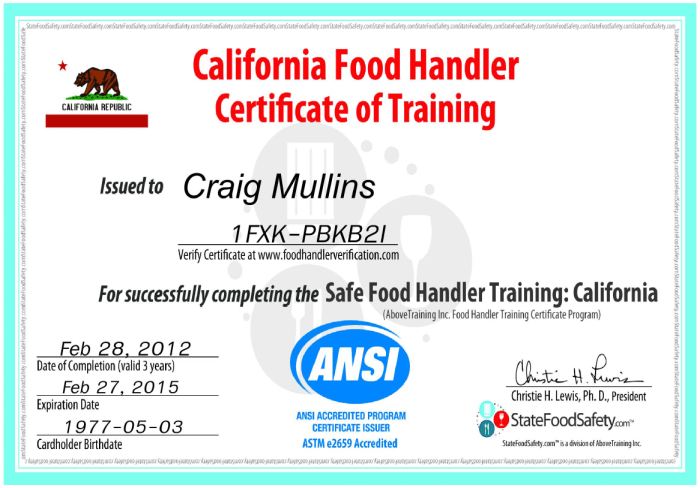Permiso de manipulacion de alimentos – El permiso de manipulación de alimentos es un requisito esencial para cualquier negocio que maneje alimentos, garantizando el cumplimiento de las normas de seguridad alimentaria y protegiendo la salud pública. Este artículo proporciona una guía completa sobre los requisitos, beneficios y mejores prácticas asociados con este permiso, empoderando a las empresas para garantizar la seguridad de los alimentos y prevenir enfermedades transmitidas por los alimentos.
Los reglamentos de seguridad alimentaria y las directrices establecidas por las autoridades sanitarias brindan un marco para garantizar que los alimentos se manipulen y preparen de manera segura. El incumplimiento de estas regulaciones puede tener graves consecuencias, incluyendo multas, cierres y daños a la reputación.
Los negocios con permisos de manipulación de alimentos deben estar familiarizados con estas regulaciones y tomar medidas para cumplirlas.
Food Safety Regulations and Guidelines

Food safety regulations are essential for businesses handling food to ensure the safety of consumers. These regulations provide specific guidelines and standards that must be followed to minimize the risk of foodborne illnesses and protect public health.
Non-compliance with food safety regulations can have severe consequences, including fines, license suspensions or revocations, and even criminal charges. It can also damage the reputation of the business and lead to a loss of customers.
Specific Food Safety Regulations, Permiso de manipulacion de alimentos
- Food Code: The Food Code is a comprehensive set of regulations that provide food safety standards for retail and food service establishments.
- Hazard Analysis and Critical Control Points (HACCP): HACCP is a systematic approach to identifying, evaluating, and controlling food safety hazards.
- Allergen Labeling: Food businesses are required to label foods that contain common allergens, such as peanuts, milk, and wheat.
- Temperature Control: Food must be stored and cooked at the proper temperatures to prevent the growth of harmful bacteria.
- Personal Hygiene: Food handlers must maintain good personal hygiene practices to prevent the spread of foodborne illnesses.
Training and Certification Requirements

Obtaining a food handling permit typically requires completing a food handling training and certification program. These programs cover topics such as food safety principles, proper food handling techniques, and sanitation practices.
Food handling training and certification provide numerous benefits, including:
- Improved knowledge and understanding of food safety principles.
- Enhanced ability to identify and control food safety hazards.
- Increased confidence in handling food safely.
- Compliance with regulatory requirements.
Inspection and Enforcement

Inspections play a crucial role in ensuring compliance with food safety regulations. Health inspectors conduct regular inspections of food handling establishments to assess their compliance with food safety standards.
During an inspection, the inspector will examine the following areas:
- Food storage and preparation practices
- Sanitation and hygiene practices
- Employee training and certification
- Record keeping
Failing an inspection can result in various consequences, including fines, license suspensions or revocations, and mandatory corrective actions.
Best Practices for Food Handling
In addition to adhering to food safety regulations, businesses should implement best practices for food handling to further ensure food safety. These practices include:
- Proper food storage: Store food at the correct temperatures to prevent the growth of harmful bacteria.
- Safe food preparation: Follow proper cooking and preparation techniques to kill harmful bacteria.
- Cross-contamination prevention: Prevent the transfer of harmful bacteria from one food to another by using separate cutting boards and utensils.
- Personal hygiene: Food handlers must maintain good personal hygiene practices, such as washing hands frequently and wearing clean clothing.
Record Keeping and Documentation
Maintaining accurate records of food handling activities is essential for compliance with food safety regulations. These records provide evidence of the business’s efforts to ensure food safety and can be used to identify and correct any potential problems.
Businesses are required to keep records of the following:
- Food safety training and certification
- Temperature logs
- Sanitation and cleaning records
- Pest control records
Technology can streamline record keeping by automating data collection and storage.
Foodborne Illnesses and Outbreak Prevention: Permiso De Manipulacion De Alimentos
Foodborne illnesses are a major public health concern, causing millions of cases of illness and thousands of deaths each year.
Preventing foodborne illnesses requires proper food handling practices. Food handling permits play a vital role in ensuring that food handlers are trained and certified in food safety principles.
By following food safety regulations and best practices, businesses can help prevent foodborne illnesses and protect the health of their customers.
Quick FAQs
¿Qué beneficios ofrece la capacitación y certificación en manipulación de alimentos?
La capacitación y certificación en manipulación de alimentos brindan a los empleados conocimientos y habilidades esenciales para manejar los alimentos de manera segura, reduciendo el riesgo de contaminación y enfermedades transmitidas por los alimentos.
¿Qué consecuencias puede tener el incumplimiento de las regulaciones de seguridad alimentaria?
El incumplimiento de las regulaciones de seguridad alimentaria puede resultar en multas, cierres temporales o permanentes, daños a la reputación y responsabilidad legal por enfermedades transmitidas por los alimentos.
¿Qué mejores prácticas de manipulación de alimentos se deben seguir?
Las mejores prácticas de manipulación de alimentos incluyen el lavado frecuente de manos, la desinfección de superficies, el almacenamiento adecuado de alimentos, la cocción completa de los alimentos y la prevención de la contaminación cruzada.